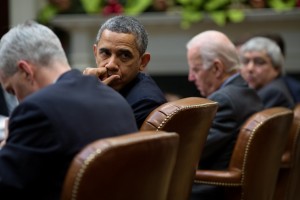Source: Consortium News
With the neocons again ascendant -- and with the U.S. news media again failing to describe a foreign crisis honestly -- Barack Obama faces perhaps the greatest challenge of his presidency, a moment when he needs to find the courage to correct a false narrative that his own administration has spun regarding Ukraine -- and to explain why it's crucial to cooperate with Russian President Vladimir Putin in the cause of world peace.
In other words, if Obama is to salvage his historical legacy, he must find within himself the strength and eloquence that President John F. Kennedy displayed in possibly his greatest oration, his June 10, 1963 address at American University in Washington, D.C. In that speech, Kennedy outlined the need to collaborate with Soviet leaders to avert dangerous confrontations, like the Cuban Missile Crisis of 1962.
"What kind of peace do I mean and what kind of a peace do we seek? Not a Pax Americana enforced on the world by American weapons of war. Not the peace of the grave or the security of the slave. I am talking about genuine peace, the kind of peace that makes life on earth worth living, and the kind that enables men and nations to grow, and to hope, and build a better life for their children -- not merely peace for Americans but peace for all men and women, not merely peace in our time but peace in all time."
Kennedy recognized that his appeal for this serious pursuit of peace would be dismissed by the cynics and the warmongers as unrealistic and even dangerous. The Cold War was near its peak when Kennedy spoke. But he was determined to change the frame of the foreign policy debate, away from the endless bravado of militarism:
"I speak of peace, therefore, as the necessary, rational end of rational men. I realize the pursuit of peace is not as dramatic as the pursuit of war, and frequently the words of the pursuers fall on deaf ears. But we have no more urgent task. ..."Too many of us think it is impossible. Too many think it is unreal. But that is a dangerous, defeatist belief. It leads to the conclusion that war is inevitable, that mankind is doomed, that we are gripped by forces we cannot control. We need not accept that view. Our problems are manmade; therefore, they can be solved by man. And man can be as big as he wants. No problem of human destiny is beyond human beings."
And then, in arguably the most important words that he ever spoke, Kennedy said...
"For in the final analysis, our most basic common link is that we all inhabit this small planet. We all breathe the same air. We all cherish our children's futures. And we are all mortal."
Kennedy followed up his AU speech with practical efforts to work with Soviet leader Nikita Khrushchev to rein in dangers from nuclear weapons and to discuss other ways of reducing international tensions, initiatives that Khrushchev welcomed although many of the hopeful prospects were cut short by Kennedy's assassination on Nov. 22, 1963.
Eisenhower's Warning
Kennedy's AU oration was, in many ways, a follow-up to what turned out to be President Dwight Eisenhower's most famous speech, his farewell address of Jan. 17, 1961. That's when Eisenhower ominously warned that...
"In the councils of government, we must guard against the acquisition of unwarranted influence, whether sought or unsought, by the military-industrial complex. ... We must never let the weight of this combination endanger our liberties or democratic processes."
Arguably no modern speeches by American presidents were as important as those two. Without the phony trumpets that often herald what are supposed to be "important" presidential addresses, Eisenhower's stark warning and Kennedy's humanistic appeal defined the challenges that Americans have faced in the more than half century since then.
Those two speeches, especially Eisenhower's phrase "military-industrial complex" and Kennedy's "we all inhabit this small planet," resonate to the present because they were rare moments when presidents spoke truthfully to the American people.
Nearly all later "famous" remarks by presidents were either phony self-aggrandizement (Ronald Reagan's "Mr. Gorbachev, tear down that wall" -- when the wall wasn't torn down until George H.W. Bush was president and wasn't torn down by Mikhail Gorbachev anyway but by the German people). Or they are unintentionally self-revealing (Richard Nixon's "I am not a crook" or Bill Clinton's "I did not have sexual relations with that woman.")
Obama has yet to leave behind any memorable quote, despite his undeniable eloquence. There are his slogans, like "hope and change" and some thoughtful speeches about race and income inequality, but nothing of the substance and the magnitude of Eisenhower's "military-industrial complex" and Kennedy's "we all inhabit this small planet."
But now may be the time for Obama to deliver a speech that grapples with the central foreign policy question facing the United States, essentially whether America will continue seeking to be an Empire or return to being a Republic. Obama also needs to confront the crisis in the political/media worlds where propaganda holds sway and the public is misled.
If Obama doesn't meet this challenge head on -- and explain to the American people why he has sought (mostly behind the scenes) to work with Russian President Putin to reduce tensions over Syria and Iran -- he can expect that the final years of his presidency will be overwhelmed by neocon demands that he start up a new Cold War.
Taunting Obama as Weak
(Note: You can view every article as one long page if you sign up as an Advocate Member, or higher).






